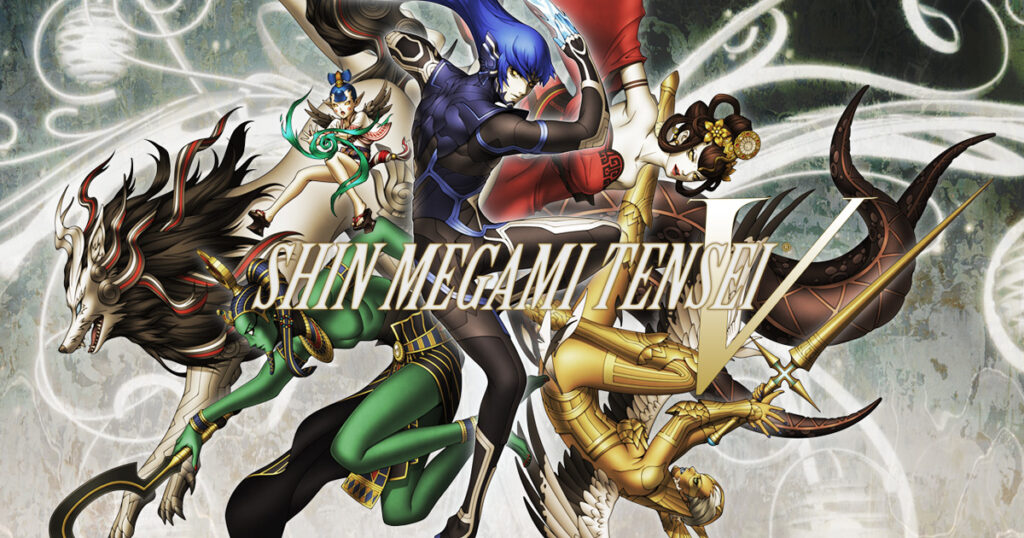
Shin Megami Tensei V is a long running series that dates back as far as 1987, with the first game being on the MSX and the Famicom. Even though this is numbered as the fifth entry, Shin Megami Tensei has many sub-series and spin-offs, across many platforms over the generations.
Revelations to some, Digital Devil Story to others; the through line has always been a modern day setting with a few glances into a post apocalyptic world. The occult and the blending of various cultural myths have always been a major aspect of this series, and Shin Megami Tensei V is no exception.
While the rerelease of Shin Megami Tensei III Nocturne was a sloppy remaster of an excellent game; it was seemingly a stop-gap for the long awaited V. This was one of the earliest Nintendo Switch announcements after all, and expectations would be high. Has the wait been worth it? Is Shin Megami Tensei V destined for glory or damnation?
Shin Megami Tensei V
Developer: Atlus
Publisher: Sega, Atlus, Nintendo
Platforms: Nintendo Switch
Release Date: November 11, 2021
Players: 1
Price: $59.99 USD
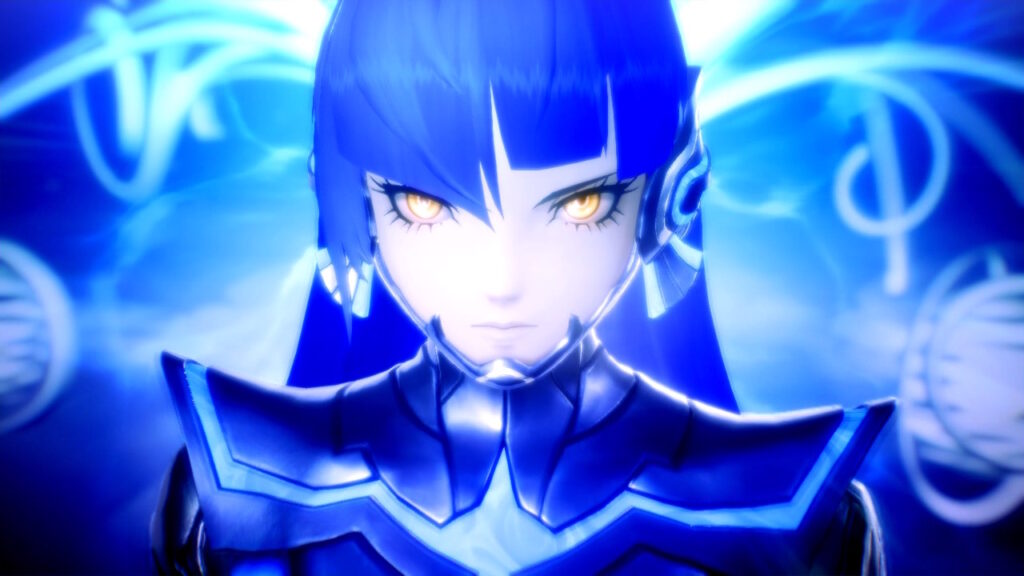
Shin Megami Tensei V had everything going against it when looking at the build up within hindsight. This is a franchise that is notoriously hardcore, dealing with really heavy theological themes and putting players in tough situations. This isn’t like a Final Fantasy or a Dragon Quest where the experience was accessible; Shin Megami Tensei is as niche as it gets for JRPGs.
The development cycle languished for almost five years, making gamers question if it was canceled. Talk of Atlus using Unreal Engine 4 on Nintendo Switch’s modest specs also aroused a lot of concern. Atlus had never used Unreal before, and the engine could yield embarrassing results when not in experienced hands. It wasn’t even guaranteed that Shin Megami Tensei V would get western localization.
Most worrying of all was how the design and core ethos of Shin Megami Tensei could be diluted and dunked down for mass appeal. Persona was originally one of the many spin-offs of Shin Megami Tensei, and the surging success of Persona 5 had fans concerned that it would influence its style.
With almost everything stacked against it; Shin Megami Tensei V turned out to be the best JRPG since Yakuza: Like a Dragon.
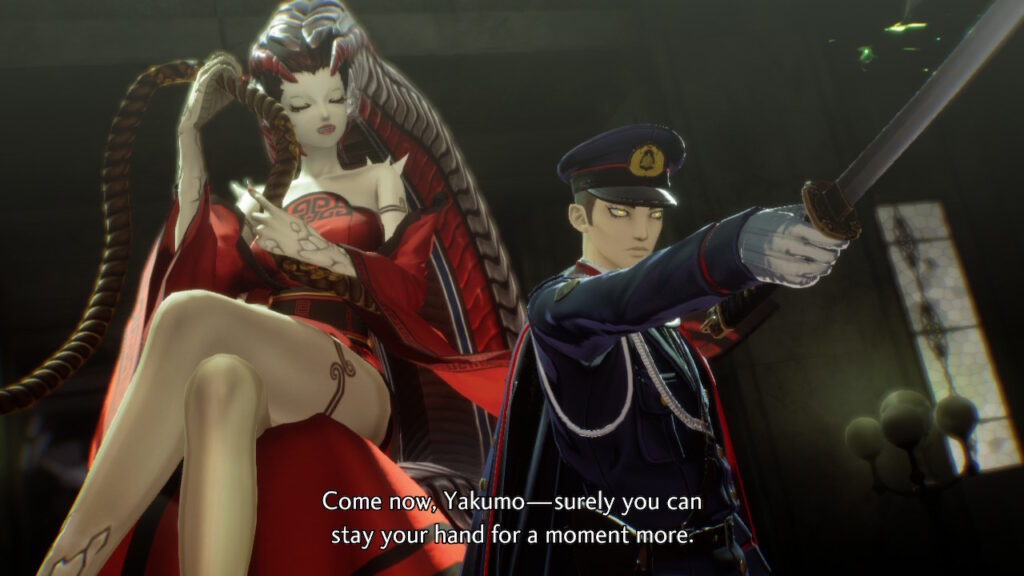
The premise in Shin Megami Tensei V is that god has died, and Lucifer is triumphant with turning the world into a hellish wasteland. The protagonist is ripped from his daily mundane school life, and is hurled into Lucifer’s new domain; Da’at.
Immediately, the leading twink fuses with the “proto-fiend;” a man made work-in-progress god who goes by Aogami, and they become the Nahobino. Since god is dead in Da’at, the position for a bringer of law is open.
With the hero fused with the proto-fiend, Nahobino a sporting chance. He just has to deal with the remnants of the avatars of law, and various demons and deities who are also fighting for the spot. Shin Megami Tensei V has a very hands-off approach with its narrative.
There will be large stretches of pure gameplay and side-questing, with major events book-ending journeys across Da’at. The tone and style throughout is cold and cynical; every NPC will treat the player like a sucker. Anyone going in assuming this to be a standard JRPG will be in for a rude awakening, due to how it subverts a lot of what popular JRPGs are known for.
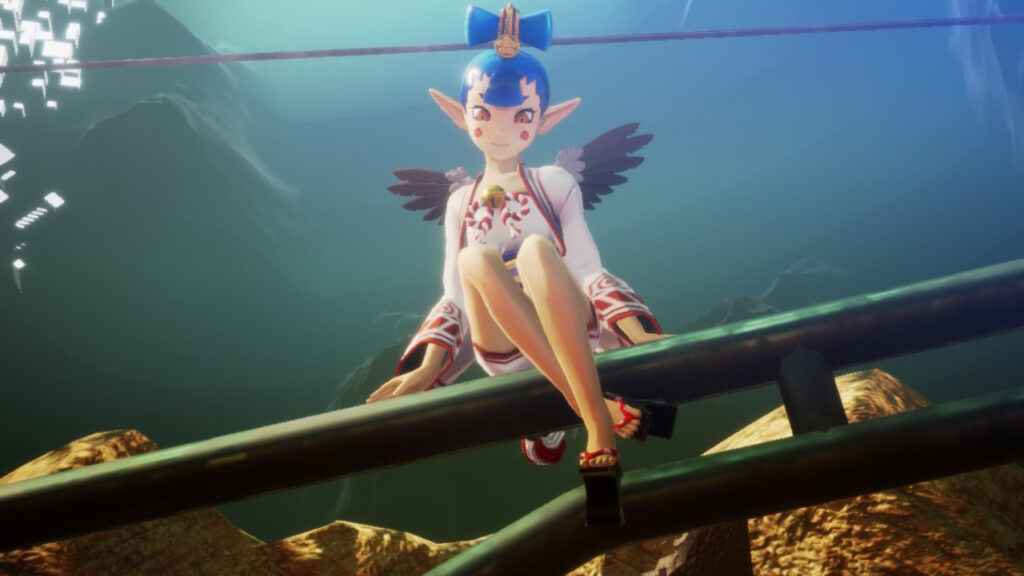
The path to godhood was never going to be easy. Shin Megami Tensei V can be a challenging game if the player does not take the time to understand the nuances of the “press-turn” system. Regardless of how many party members are present, the party and enemies are allotted four turns; which can be extended to a maximum of eight.
Certain actions can lead to losing all turns available, like missing. This applies to enemies too, and both sides can gain extra turns if weaknesses are exploited. What makes Shin Megami Tensei V so special is just how carefully balanced it is. This isn’t like most RPGs where powering through battles by mashing a basic attack is viable- playing like that can lead to a game over from a basic encounter.
Strategizing is crucial to the Shin Megami Tensei V experience. This is one of the few RPGs where the player’s stock of items can mean salvation or damnation. Grinding for cash and maxing out items will only get you so far, as individual items come with hard caps, with the most useful ones only allowing a maximum of three total. What matters is the team of demons that Nahobino assembles.
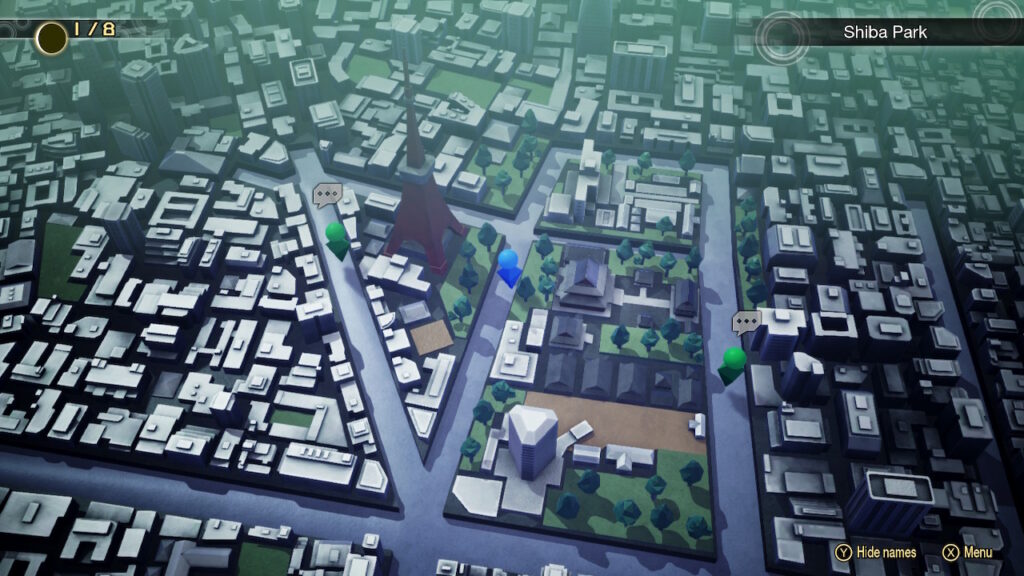
Boss battles are especially challenging, and veer into puzzle-like territory with how players will have to plan ahead. The team that was carefully built to specialize in one element for a tough boss can happen if a party leans too far in one direction. Each foe and potential ally are perfectly represented with their elemental strengths, weaknesses, and abilities. Being a mythology buff can actually help you.
Summoning and fusing demons is part and parcel for the Shin Megami Tensei experience, and this latest entry streamlines it and cuts out a lot of the guesswork. Building a preferred team of demons, deities, lesser gods, and actual gods has never been easier; now that the reverse compendium fusion option exists.
This means the Nahobino should only concern himself with acquiring any unregistered demon as often as possible. Doing so fills out the compendium, which can be used to summon otherwise unobtainable demons with what is in the current stock.
Having a record is what counts. So long as Nahobino’s pockets have the macca and is a high enough level, he will be able to summon some powerful party members for his journey.
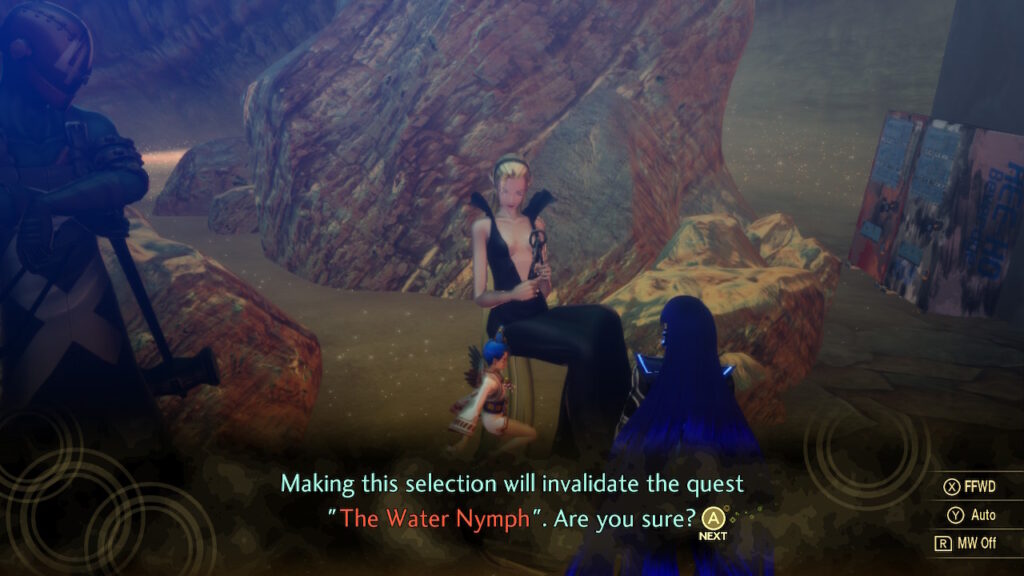
Life in Da’at is not always just battling; the boys at Atlus have left the old design philosophy of grid-like labyrinths of hallways as seen in past Shin Megami Tensei games. This was a series that was founded on old-school dungeon crawling style gameplay, and was always a hurdle for most gamers to overcome.
In Shin Megami Tensei V, the settings are wide open biomes full of nooks and crannies to explore. While not exactly open-world, each of the four main areas are big enough that fast traveling between the save points is necessary to cut down on lengthy traversal.
There is a lot to see, and Da’at has plenty of caves to spelunk and ravaged buildings to explore. Nahabino is also more fluid than prior Shin Megami Tensei protagonists. Jumping and light platforming make their way into Shin Megami Tensei V, and the result is that the game takes on some collect-a-thon characteristics with having to seek out the many mimans; which are like Jingos from Banjo-Kazooie.
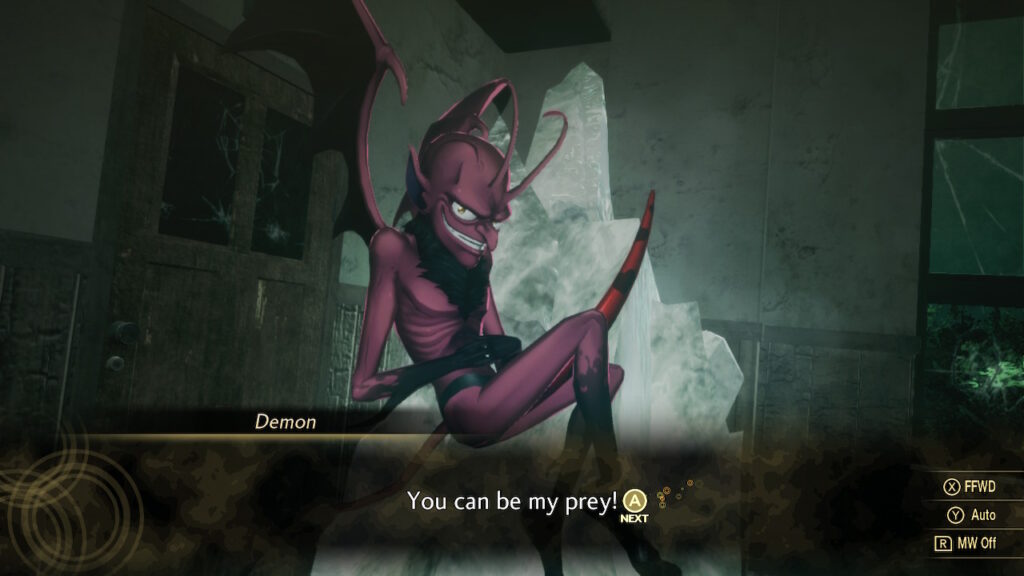
Exploration and seeking out miman is a major pillar of Nahobino’s growth, since finding these little guys are a great way to acquire glory. Miracles and upgrades like expanding the amount of abilities available in combat, which element to specialize in, or increasing the slots available for demons; are all reliant on how much glory is earned.
There are many other features that can be bought with glory, and sometimes stumbling across a large cache of glory can happen while exploring. Every bit will count, and will be necessary to make Nahobino worthy for godhood. Finding miman also nets a few bonus items from the kindly zombified merchant, which are guaranteed to be useful.
Some of the earnings from finding miman are essences of demons; and essence is how Nahobino expands his abilities, and modifies his affinities. The protagonist learns nothing from leveling up- he only gains stat boosts. To learn abilities, expect to rely on the essences of various demons.
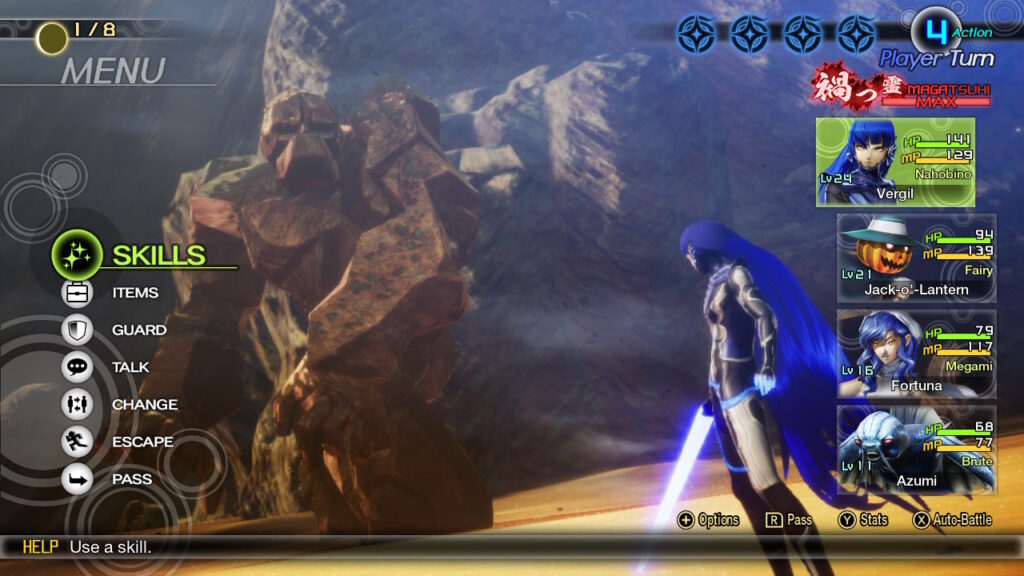
Essence can be acquired from treasure boxes, as gifts from enemy encounters from talking, or from a demon leveling up. While Nahobino can use multiple essences to a point, he can only hold one essence of each enemy type, and some essences are more rare than others. Some only show up once or twice, and those are the ones where the player will be faced with a tough choice: affinity or abilities?
Taking the affinity of Huang Long the dragon god means getting strong resiliences to most elements. However, the essence also has his powerful attacks, and the player is free to take whichever ability they can hold. There may be only one Huang Long essence, and choosing affinity over ability means losing the other until the next new game plus cycle, and having to do the lengthy and challenging sidequest again.
The side quests in Shin Megami Tensei V are plentiful and diverse, but no matter what, it always feels like the quest givers in Da’at are taking Nahobino for a ride. Sometimes a demon will send Nahobino around to do their dirty work, only to pick a fight with him upon completion, and be powered up due to the player unknowingly giving them power.
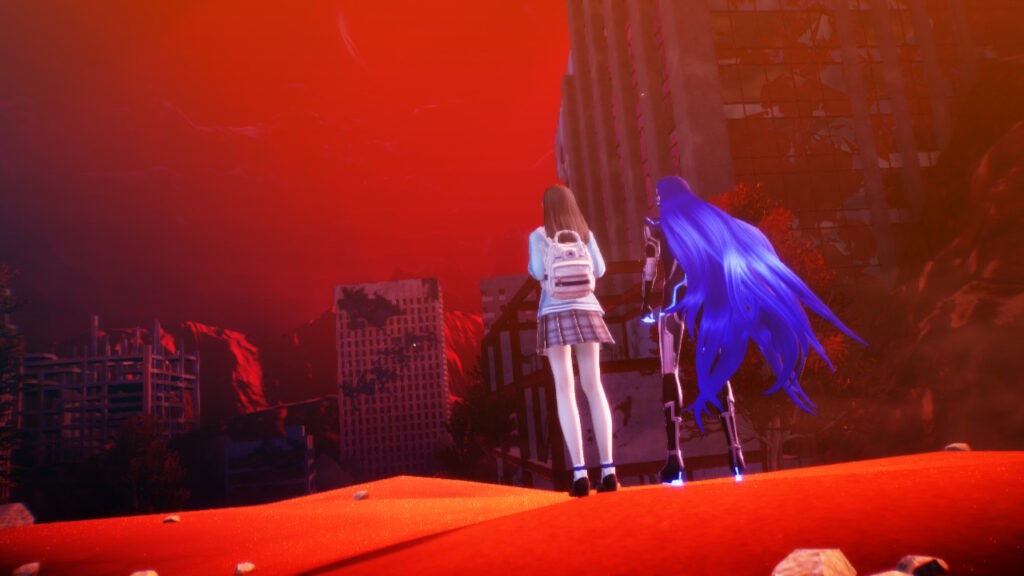
This kind of cheeky subversion and sneakiness is a reoccurring gag through out Shin Megami Tensei franchise, and V continues this trend. Even when trying to recruit demons during battles by talking to them, being diplomatic is not always the best course of action, since some demons only respect vulgar displays of power or degeneracy.
Other times, Shin Megami Tensei V will do skill checks on Nahobino’s stats to see if he’s got what it takes to recruit a specific demon, so how players build his character matters. Figuring out what demons want to hear to get them to join is only a matter of understanding their character. Bribing them gets gamers so far, but they are less likely to get Greeked from their hard earned macca and items like in Nocturne.
Sometimes talking is the only way out of a dire situation in Shin Megami Tensei V. Once in a while, Nahobino may find himself in a battle where he is outgunned, and is in a war of attrition. In these moments, talking your way out is the only means to get out alive. This is why this franchise is above most RPGs; avoiding confrontations with role-playing, instead of resorting to standard ultra-violence.
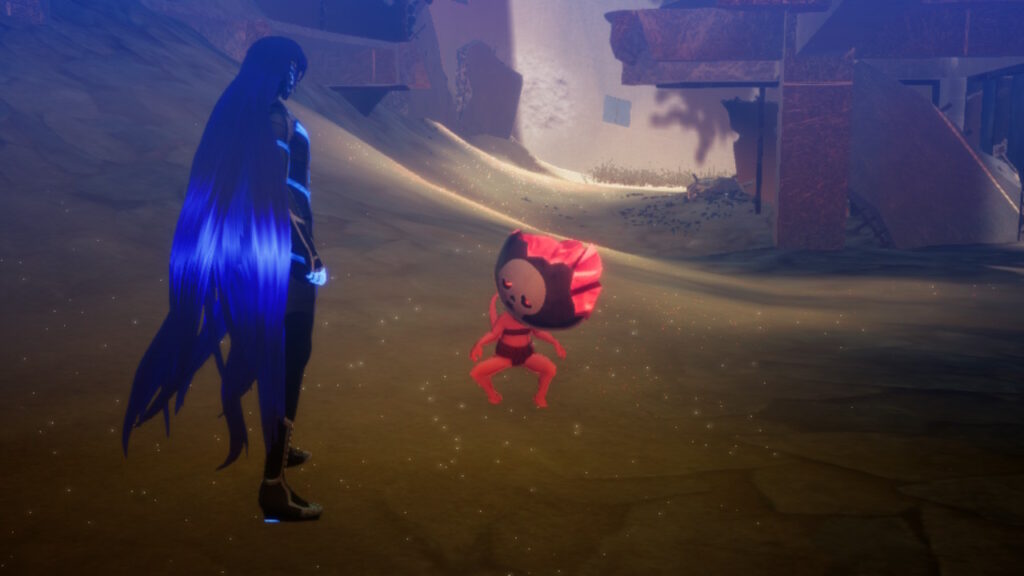
Roaming Da’at can be breathtaking, but it is also where Shin Megami Tensei V can fall short. The limitations of Unreal Engine 4 on Nintendo Switch are seen with the low draw distance; foliage and low level detail pop-in are present throughout the vast wastelands.
The sub 30 frames per second while exploring the larger expanses are felt, and the on screen roaming characters animation and half the frame rate to save on resources. The overall presentation is hit the hardest here, and despite the roughness, its impressive how fast the load times are in Shin Megami Tensei V.
Battles come and go quickly, and fast traveling takes a reasonable amount of time. Even when booting up a save file, the time to load is very reasonable. It’s a miracle that Atlus managed to be this proficient with Unreal on their first time, and it goes to show that the lengthy development time did not go to waste.
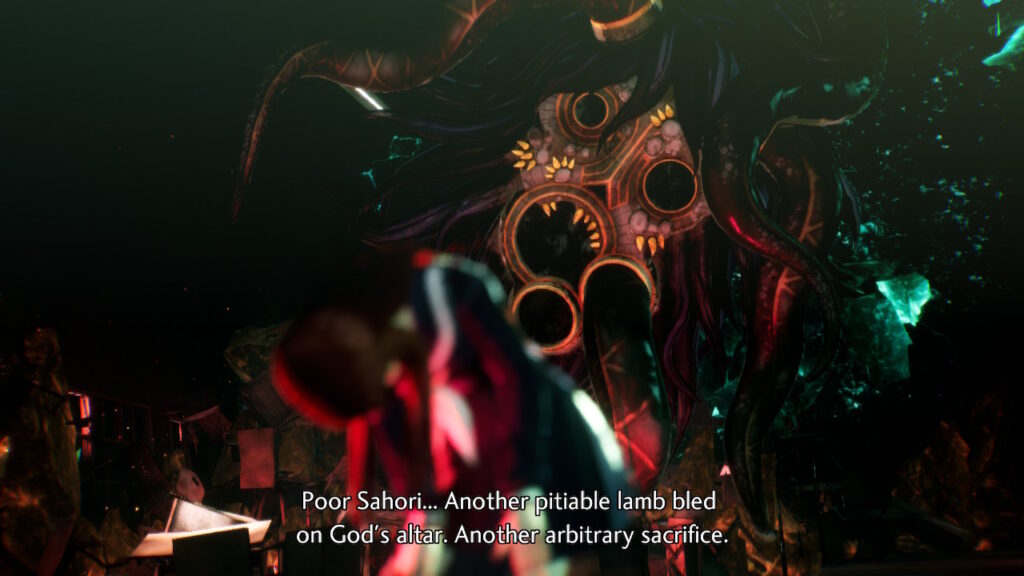
The visuals and music go a long way in carrying the feel of Shin Megami Tensei V. The art direction may not have Kazuma Kaneko this time around, but his designs and influence are still present. His stark coldness and intricate designs are a perfect fit for Unreal. Compounded with the lurid lighting effects, V stands tall as one of the most artistic looking games on Nintendo Switch.
Cutscenes are especially well directed, and have a strong cinematic flair. The voice acting is noteworthy for having grounded performances that don’t sound like typical anime voice acting.
A few stand outs is the oafish Yuzuru, who’s arc transforms him into one of the most heroic characters in the story. Another is Paul Eiding as Lucifer, who’s well mannered yet soulful interpretation adds a lot of depth to how the prince of chaos is typically depicted.
Shin Megami Tensei V is a biblical spirit journey where the player is given choices that play into the possible four endings- one of which can only be acquired in new game plus. Which ending the player gets is determined by their alignment from dialogue choices. Uphold God’s lawful legacy, or descent further into Lucifer’s chaos? Or maybe take the third, neutral option? The onus is on the gamer to decide.
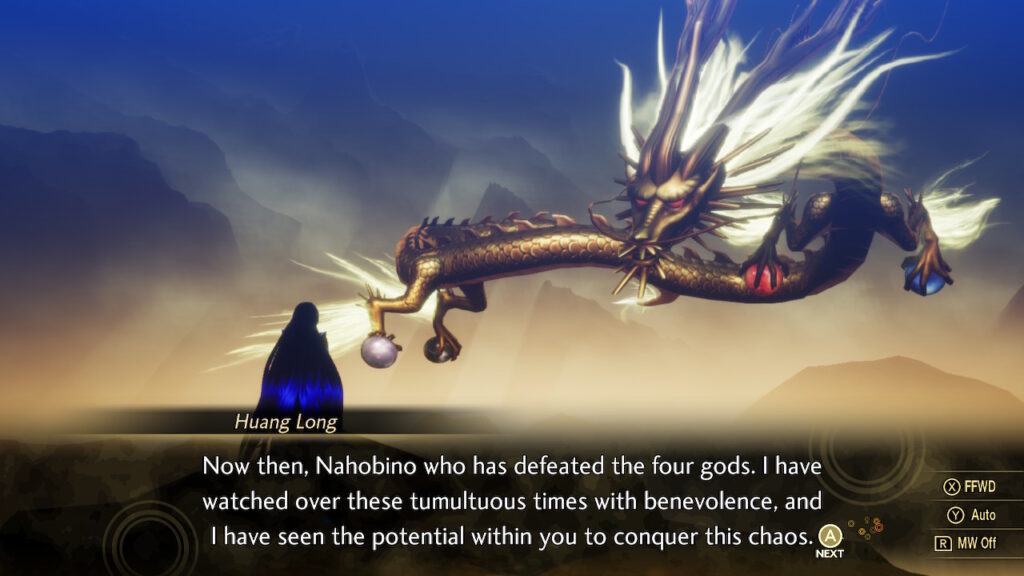
Shin Megami Tensei V is the great big AAA production JRPG that doesn’t dumb itself down. It’s every bit as hardcore and deep as its predecessors, and does it all in a sleek and dazzling veneer. Exploration is more meaningful, and the experience of summoning demons has taken out all the guesswork.
Atlus made the appropriate choices on what to streamline and what to expand, to make the gameplay engrossing and stimulating. The flow of combat encounters and exploration is pitch perfect. There is always something to see and do.
The long wait for Shin Megami Tensei V has been worth it. This could have been another disaster like prior games with lengthy development cycles, but this is the one that actually delivers on all of its promises and then some.
Shin Megami Tensei V was reviewed on Nintendo Switch using a copy purchased by Niche Gamer. You can find additional information about Niche Gamer’s review/ethics policy here.